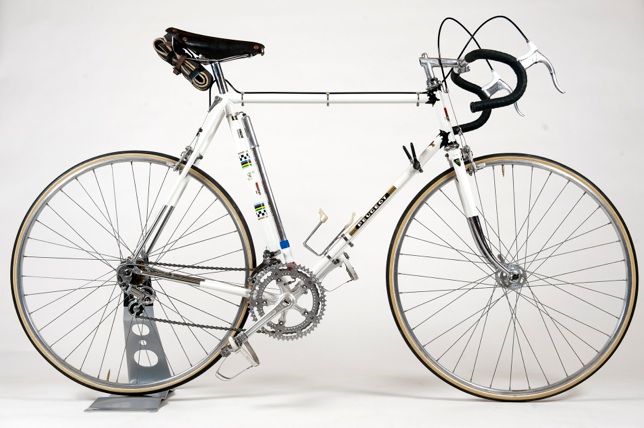70-Talet
MINA FAVORITER
Årtal / Team / Cyklar / Cyklister
Peugeot-BP-Michellin
Peugeot PX
Bernhard Thevenet
1970
Händelser under året 1970
Professionell boxning förbjuds i Sverige.
I Sverige får utomäktenskapliga barn samma arvsrätt efter svenska medborgare som barn födda inom äktenskapet samt rätt att ta faderns efternamn
Sydkraft får tillstånd att uppföra en första kärnreaktor i Barsebäck.
Den svenska sambeskattningen tas bort så att beskattningen blir individuell, inte hushållsbunden, vilket gynnar hushåll där alla vuxna arbetar. Den direkta statsskatten sänks, vilket kompenseras med en höjning av momsen från 9 till 14 procent.
Sveriges riksdag beslutar om arbetstidsförkortning, och gör normalarbetsveckan 40 timmar lång
Elransonering, vilken kommer att vara i en månad, införs i Sverige.
Sveriges Radio-TV börjar sända i färg över hela Sverige
The Beatles splittras.
Den amerikanska raketen Apollo 13 skjuts upp.
Sveriges riksdag beslutar, inför krav att läkemedelsindustrin skall förstatligas, att begränsa sig till apoteken genom organisera dem i Apoteksbolaget AB. Bolaget skall gemensamt ägas av staten (majoritetsägare) och Apotekssocieteten.
35-årige Pehr G. Gyllenhammar utses till chef för Volvo efter svärfadern Gustav Engellau.
Oljefyndigheter utanför Norges Nordsjökust hittas
Brasilien besegrar Italien med 4-1 vid VM-finalen i fotboll i Mexico City
Stockholms tingsrätt fastställer skadeståndskrav från 100 barn som drabbats av handikapp på grund av att deras mödrar använde Neurosedyn under graviditeten
Palestinska PFLP kapar fyra passagerarplan från flygbolagen El Al, Pan American, Swissair och TWA på olika platser i Europa.
Gunnar Larsson, Sverige blir trefaldig Europamästare i simning i Barcelona, med guld på 200 och 400 meter fritt samt på 400 meter medley
Den svenska tvåkammarriksdagen upplöses efter 104 år och ersätts av enkammarriksdagen.
I det första svenska Enkammarriksdagsvalet förlorar SAP sin absoluta majoritet men behåller makten genom stöd från VPK
Den svenska regeringen inför allmänt prisstopp för första gången sedan andra världskriget
Gösta Bohman väljs till ordförande för Moderata samlingspartiet sedan Yngve Holmberg har avsatts vid en extra partistämma .
Årets nobelpristagare i litteratur, Aleksandr Solzjenitsyn har vägrats utresevisum från Sovjetunionen och kan därför inte ta emot priset
Kärnkraftsreaktorn Oskarshamn 1, Sveriges första kommersiella kärnkraftverk, startas för provkörning.
Genom en lagändring blir skilsmässa tillåtet i Italien.
Heroinmissbruk börjar runt denna tid bli ett stort problem i Sverige
De fasta bokpriserna avskaffas i Sverige, vilket slår hårt mot bokhandeln, men ger bokklubbarna möjlighet att sälja böcker till lägre pris.
Etapploppen Vinnare
Paris Nice Eddy Merckx Bel
Tireno Adriatico Tony Houbrechts Bel
Tour de Romandie Gösta ”Fåglum” Sve
Giro de Italia Eddy Merckx Bel
Criterium du Dauphine Luis Ocana Spa
Tour de Suisse Roberto Poggiali Ita
Tour de France Eddy Merckx Bel
Vuelta Espana Luis Ocana Spa
Loppen:
Endagars klassiker Vinnare
Milan-Sanremo Michele Dancelli Ita
Gent Wevelgem Eddy Merckx Bel
Ronde van Vlaanderen Erik Leman Bel
Paris-Roubaix Eddy Merckx Bel
Amstel Gold Race Georges Pintens Bel
La Fleche Walonne Eddy Merckx Bel
Liege Basogne Liege Roger de Vlaeminck Bel
Giro de Lombardia Franco Bitossi Ita
VM Mallory Park Eng Jean-Pierre Monsere Bel
Cykelåret 1970
Peugeot - BP - Michelin 1970
Bikes
Peugeot
General Manager
Gaston Plaud, Robert Naeye
Team Composition
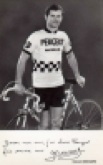
Besnard, Gérard
France
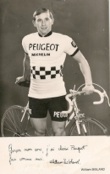
Bilsland, Billy
Great Britain
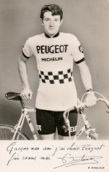
Bouloux, Robert
France

Bracke, Ferdinand
Belgium
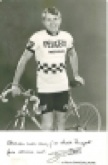
Danguillaume, Jean-Pierre
France

Daunat, Jean-Claude
France

Delisle, Raymond
France

Dumont, Jean
France
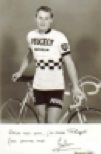
Gay, Raymond
France
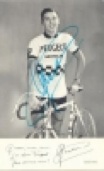
Karstens, Gerben
The Netherlands

Le Bourhis, Georges
France

Letort, Désiré
France
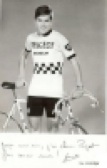
Maingon, Guy
France
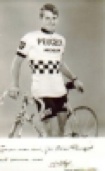
Martellozzo, Pierre
France

Mollet, André
France
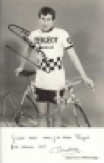
Parenteau, Jean-Pierre
France

Pingeon, Roger
France

Quesne, Jean-Louis
France

Raymond, Christian
France
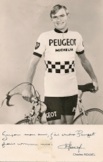
Rouxel, Charly
France
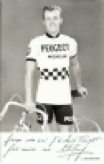
Schoeters, Joseph
Belgium
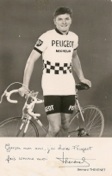
Thevenet, Bernard
France
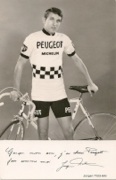
Tschan, Jürgen
West-Germany

Van Conningsloo, Georges
Belgium
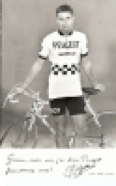
Van Der Linde, Bernard
France
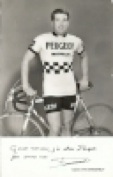
Vansweevelt, Valère
Belgium


1970 års favoritstall
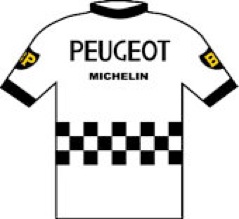
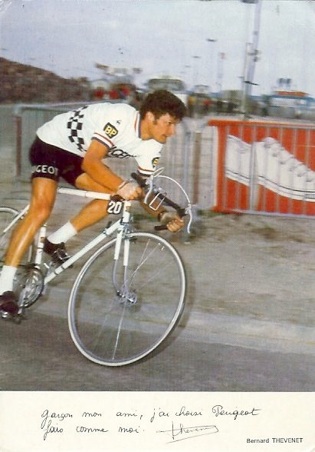
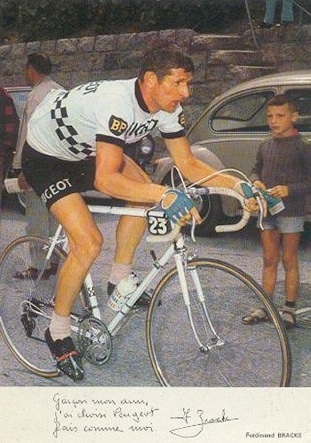
Bernhard Thevenet FRA,
Ferdinand Bracke,
Vinster 1970

14-04-1970

10-05-1970

19-05-1970

14-07-1970

15-07-1970

18-07-1970

01-08-1970

15-08-1970

13-09-1970

13-09-1970

27-09-1970

1970 års favoritcykel
Peugeot PX 10
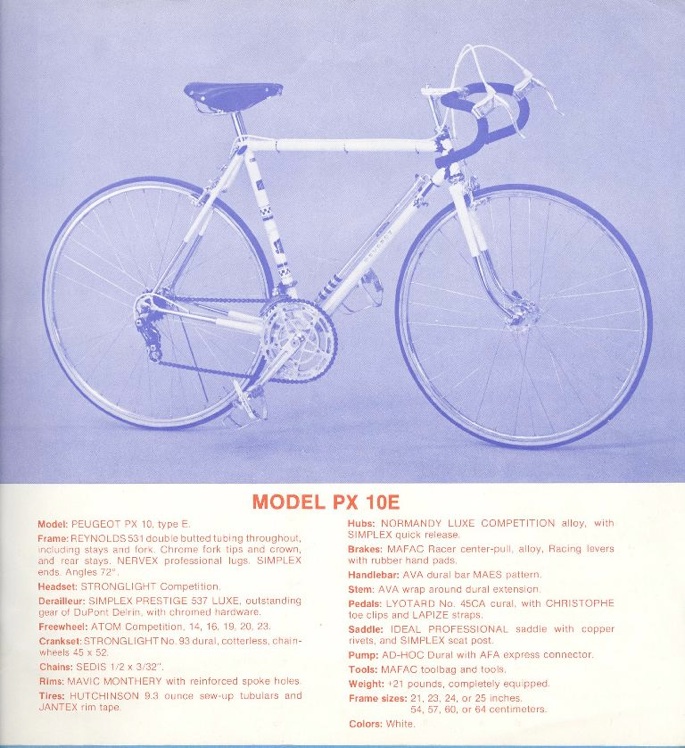
1970 års favoritcyklist
Bernhard Thevenet
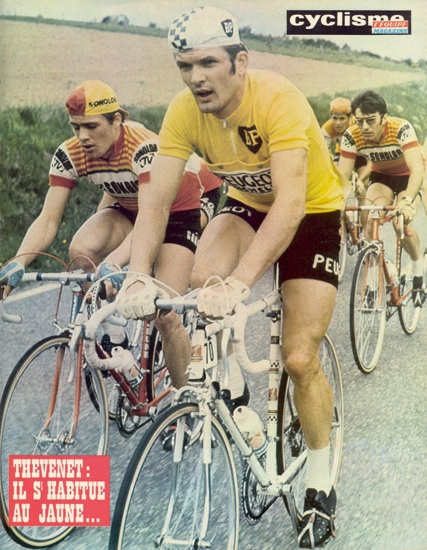
Thévenet turned professional with Peugeot-BP-Michelin in 1970. He rode the Tour de France for the first time in 1970, as a last-minute stand-in. He said: "I wasn't even a reserve in 1970 but, because two riders in the team had fallen ill at Peugeot, the directeur sportif picked me two days before the start." Gaston Plaud had to call a neighbour in the village because neither Thévenet's nor many other families had telephones. Thévenet had left to train with a friend, Michel Rameau, and his mother got a message to him at Rameau's house.
Thévenet asked the advice of Victor Ferrari, a friend who rode the Tour in 1929. Thévenet said: "He was probably afraid that I'd hesitate and he said: 'You're not going to say No, are you crazy? Go on, go...'" Thévenet remembered:
I can remember perfectly getting to Limoges [for the start]. I was anxious and scared at the same time, but full of pride. I was given a new suitcase, seven jerseys, six pairs of shorts, overclothes, sweaters, shirts and so on and so on. Everyone else had a brand new bike, but not me, because I wasn't on the team's entry list.
Thévenet won a mountain stage ending at the ski resort of La Mongie, most of the way up the Tourmalet in the Pyrenees. He said: "That evening, it was all clear [j'ai compris bien des choses]. That I'd saved my season and, because of that, my job, because the obligatory two-year contracts for new professionals didn't exist then."
In the 1972 Tour he crashed badly on a descent and was temporarily amnesic. As he began to regain his memory, he looked down at his own Peugeot jersey and wondered whether he might be a cyclist. On recognizing the team car, he exclaimed: “I’m riding the Tour de France!”
He refused to abandon the race and four days later won a stage over Mont Ventoux. In the 1973 Tour, he finished second, behind Luis Ocaña, but in 1974 he was forced to abandon the Tour on Stage 11 due to illness.
In the 1975 Tour, Thévenet attacked Eddy Merckx on the col d'Izoard on 14 July, France's national day. Merckx, who was suffering back pain from a punch by a spectator, fought back but lost the lead and never regained it. Pierre Chany wrote:
Those who were there will be slow to forget Bernard Thévenet's six successive attacks in the never-ending climb of the col des Champs, Eddy Merckx's immediate and superb response, the alarming chase by the Frenchman after a puncture delayed him on the descent of the col, the Belgian's attack on the way to the summit of the Allos, his breath-taking plunge towards the Pra-Loup valley, his sudden weakening four kilometres from the top and, to finish, Thévenet's furious push. The end of the race was frenetic. Has Eddy Merckx's long reign in the Tour de France come to an end on the Pra-Loup. Some think so; others believe that it will happen tomorrow.
A British writer, Graeme Fife, wrote:
Thévenet caught Merckx, by now almost delirious, 3km from the finish and rode by. The pictures show Merckx's face torn with anguish, eyes hollow, body slumped, arms locked shut on the bars, shoulders a clenched ridge of exertion and distress. Thévenet, mouth gaping to gulp more oxygen, looks pretty well at the limit, too, but his effort is gaining; he's out of the saddle, eyes fixed on the road. He said he could see that one side of the road had turned to liquid tar in the baking heat and Merckx was tyre-deep in it.
Beside the road, a woman in a bikini waved a sign that said: "Merckx is beaten. The Bastille has fallen." Thévenet - who had taken the climb on the larger chainring - went on to win the Tour, which that year finished on the Champs-Élysées for the first time. Merckx finished second, three minutes behind.
Thévenet won his second and last Tour in 1977. That winter he was hospitalized with a liver ailment he attributed to long-term use of steroids. Several months later Thévenet lined up for the 1978 Tour de France but had to abandon the second mountain stage in an ambulance. He left the Peugeot cycling team after 1979 and signed for the Spanish team Teka, where he won two races and a six days race with the Australian rider Danny Clark.[
He returned to a French team in his final year, 1981, where he won a stage in the Circuit de la Sarthe.
Doping
Thévenet insisted "I have never taken drugs; they wouldn't be any use." Then he was caught taking drugs. in the 1977 Paris–Nice.
His 1978 season was a shadow of his years of winning the Tour de France. He had trouble finishing even minor races. When a journalist at the radio station France Inter wondered aloud if Thévenet's repeated poor performances might be due to doping, Thévenet and his team-mates refused to talk to the station.
Thévenet went to hospital, where tests showed serious trouble with his adrenal glands. He admitted taking steroids and called for an end to drugs in the sport. "I was doped by cortisone for three years and there were many like me," he told Pierre Chany in Vélo-France. The steroids had been prescribed to him by François Bellocq, the Peugeot doctor, who had qualified only in 1976. Thévenet told Chany:
We were all convinced we were doing the right thing [être dans le vrai] and we were certain we were a step ahead of the rest so far as what we were doing to prepare for competition. The young doctor with our team had taken the time to explain to us how the body reacted to effort, which nobody had done before him. His words convinced us of his competence, and maybe we were overconfident, but I had the feeling that he was taking us out of the continual experimentation [l'empirisme habituel] to get us on a more methodical and scientific road. From then on, everything that was said around us seemed to come from ignorance, jealousy or malveillance. I was at ease with myself, satisfied deep down that I was doing my job seriously. That was how it was from 1975 until just recently.
